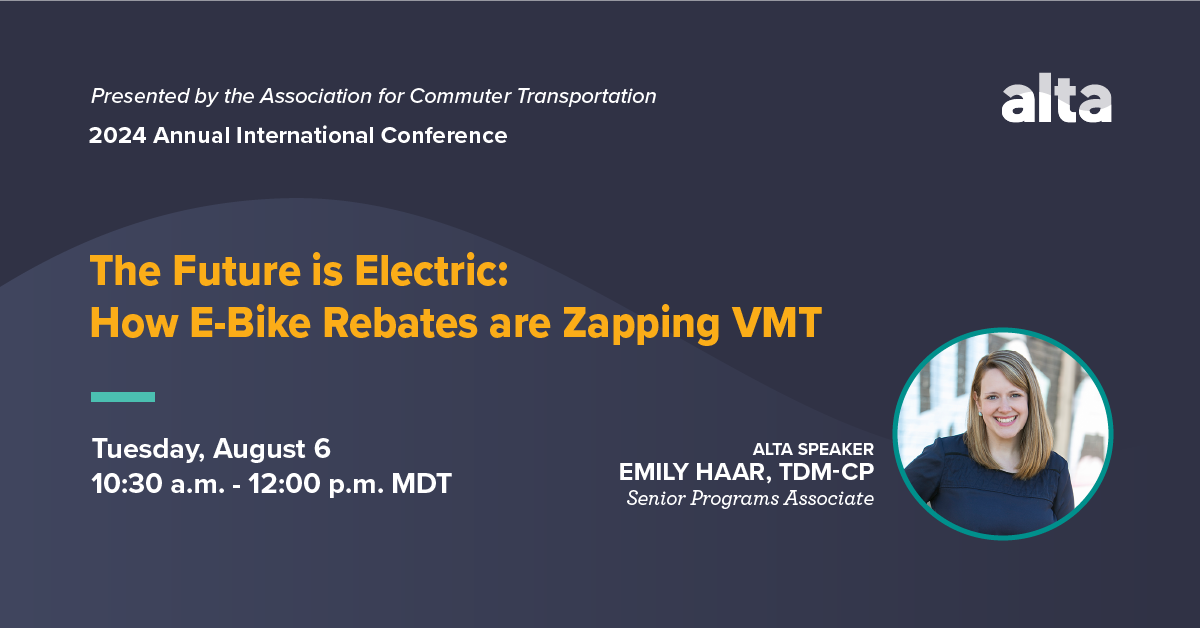
Find us at the 2024 ACT Annual International Conference in Denver, CO, from August 4–7! With over 625 attendees hailing from across the United States and around the globe, this premier event of the year attracts a diverse representation of industry leaders and changemakers. From Fortune 500 companies and state/local agencies to MPOs, TMAs, consultants, transit agencies, vendors, and transportation providers, the International Conference brings together a wide range of perspectives to tackle the sustainability challenges of our time. Also, don’t miss Alta TDM (Transportation Demand Management) leaders Aaron Gaul, Emily Haar, Cathy Cibor, and Erica Hine showcase our latest projects and groundbreaking initiatives that are highlighting the positive impact sustainable transportation is making in communities across North America.
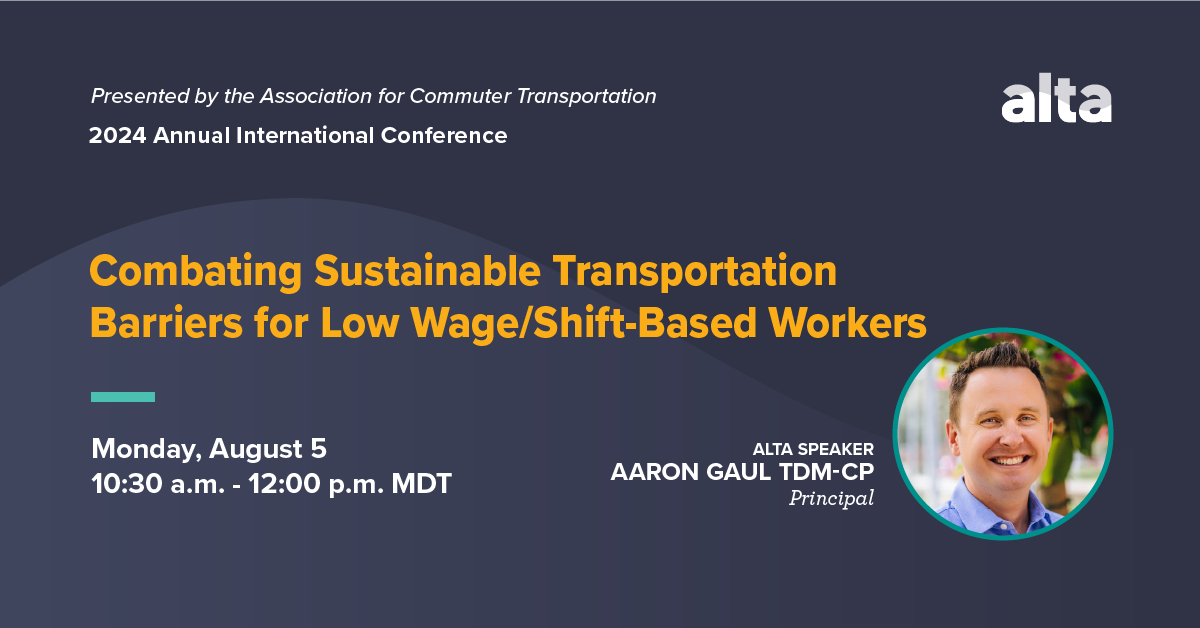
Combating Sustainable Transportation Barriers for Low Wage/Shift-Based Workers
Monday, August 5 | 10:30 a.m. – 12:00 p.m.
According to the Urban Institute, about one out of five affected workers lives in families with incomes below the federal poverty level. Commute costs, distances, and delays are just a sample of transportation barriers that low-wage and shift-based workers face in their day-to-day journey to and from their jobs. In this session, three speakers representing different regions will discuss how their agencies began breaking down these barriers in their respective situations. They will share success stories, new outreach techniques, information on hands-on experience with focus groups, and how to create resources that target low wage/shift-based workers.
Alta Speaker: Aaron Gaul
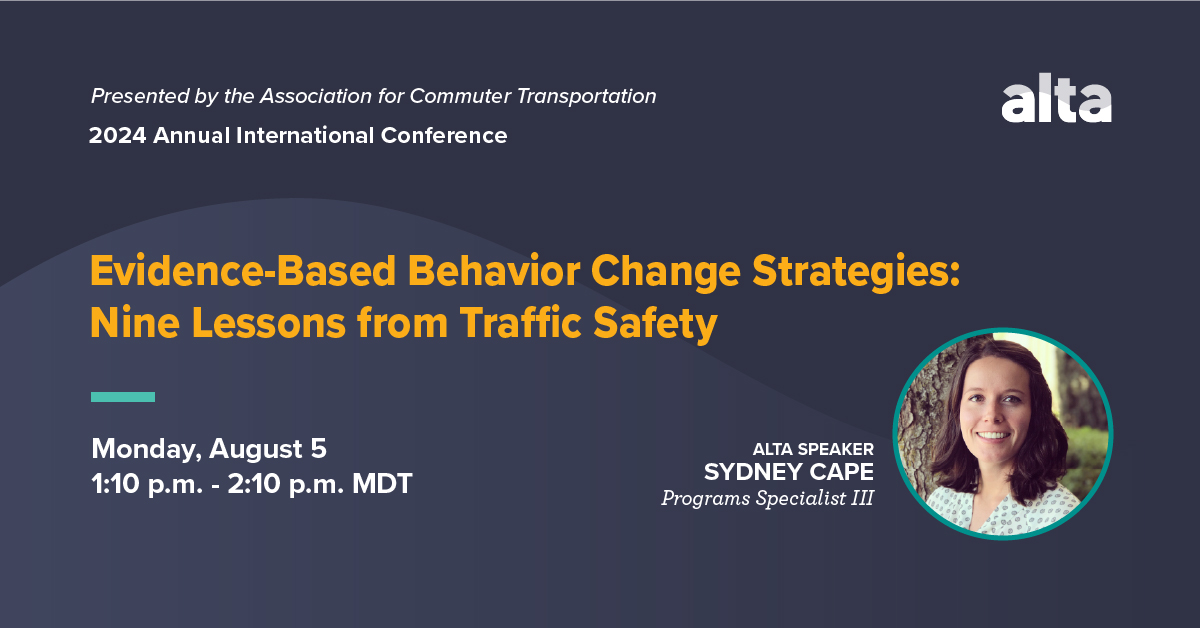
Evidence-Based Behavior Change Strategies: Nine Lessons from Traffic Safety
Monday, August 5 | 1:10 p.m. – 2:10 p.m.
Join this session to learn 9 dos and don’ts for your next behavior change campaign. Whether your work addresses traffic safety or is solely grounded in TDM, this session features evidence-based strategies for anyone implementing transportation behavior change programs. From engagement best practices to data collection, these lessons from traffic safety programs are grounded in research and a decade of real-world implementation from coast to coast. You’ll come away with effective, proven tactics that take the guess work out of behavior change marketing, communications, and engagement.
Alta Speaker: Cathy Cibor
The Future is Electric: How E-Bike Rebates are Zapping VMT
Tuesday, August 6 | 10:30 a.m. – 12:00 p.m.
E-bikes have emerged as the one of the most popular mobility options in the United States, outpacing electric car sales the past four years in a row. E-bikes can replace short car trips and transport cargo or children efficiently, while taking up significantly less parking and storage space than cars. E-bikes have been shown to cut congestion, lower transportation costs, and reduce greenhouse gas (GHG) emissions produced by vehicle tailpipe emissions.
However, despite their popularity, e-bikes remain financially out of reach for many, with prices ranging from $1,000 to $5,000 for commuter or recreational models and up to $9,000 for premium cargo e-bikes. To help combat the twin challenges of rising transportation costs and climate change, cities and states across the country have launched e-bike rebate programs to increase adoption and reduce the barrier to entry for these vehicles. By partnering with local businesses and community groups, rebate programs also allow funds from these programs to directly benefit the local economy.
This session will explore e-bike rebate programs of various sizes and scopes. In April 2022, Denver’s Office of Climate Action, Sustainability and Resiliency launched an e-bike rebate program which has put more than 7,600 people on new e-bikes, replacing an estimated 165,000 vehicle miles traveled (VMT) per week. In August 2023, building on that momentum and thanks to the passage of Senate Bill 22-193, the state of Colorado established a statewide e-bike rebate program for moderate – low-income residents distributed through the Colorado Energy Office. A few months later in January 2024, the Atlanta Regional Commission, the Metropolitain Planning Organization for the 11 county Atlanta region, launched the City of Atlanta’s E-Bike Rebate Program, which dedicated 75% of rebate funds to low-income residents. Finally, VALENCIA GO in Santa Clarita, CA launched an e-bike subsidy by collaborating with real estate professionals and residents to integrate sustainable mobility solutions seamlessly into community development.
Though all these programs arrived at distributing e-bike incentives in different ways, they share the common goal of making e-bikes more accessible, which in turn leads to increased clean commuting, reduced single-occupancy vehicles and congestion, and fewer vehicle miles traveled (VMT).
Alta Speaker: Emily Haar
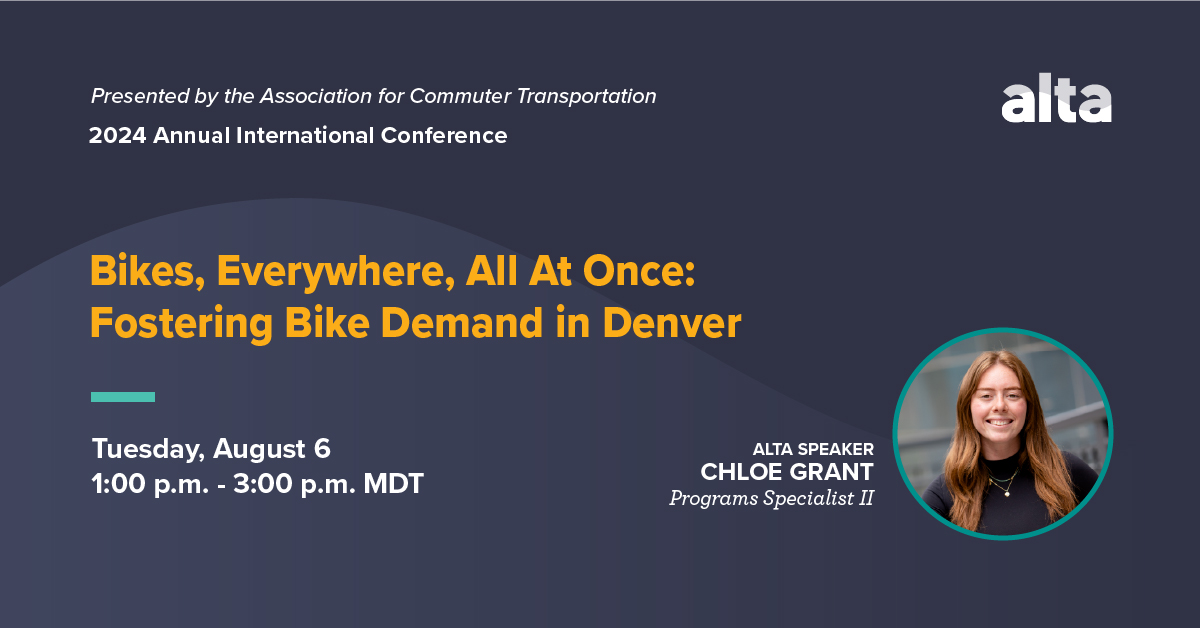
Bikes, Everywhere, All at Once: Fostering Bike Demand in Denver
Tuesday, August 6 | 1:00 p.m. – 3:00 p.m. MDT
Denver is all about e-bikes. Join this mobile session to learn how Denver is working to shift trips away from fossil fuels and fostered a e-bike boom. On this tour you’ll see and hear about e-bike libraries, e-bike rebates, e-bikes for business, and biking cash incentives.
Alta Speaker: Chloe Grant
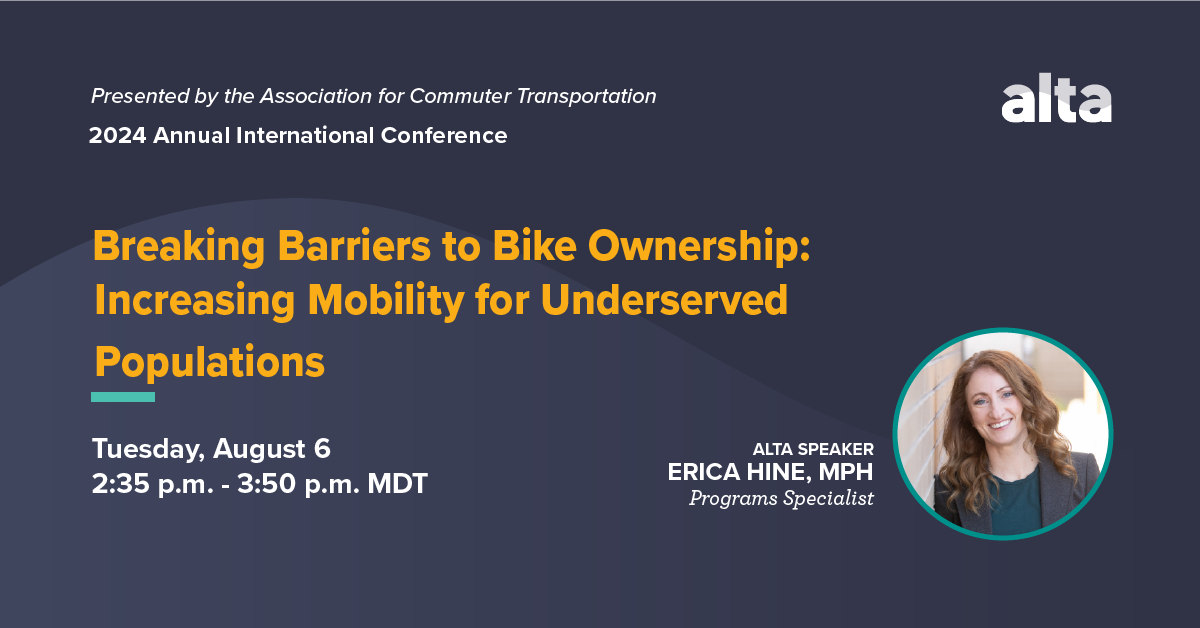
Breaking Barriers to Bike Ownership: Increasing Mobility for Underserved Populations
Tuesday, August 6 | 2:35 p.m. – 3:50 p.m.
Learn how the District of Columbia’s TDM program and Equiticity developed their bike incentive programs with an equitable lens to eliminate the barriers to bike ownership, increase mobility options in underserved populations, and reduce greenhouse gas emissions. Erica and panelists will discuss how they shared their vision and interest with the community and developed partnerships with local businesses and community organizations to ensure that those in need are served by their incentive.
Alta Speaker: Erica Hine
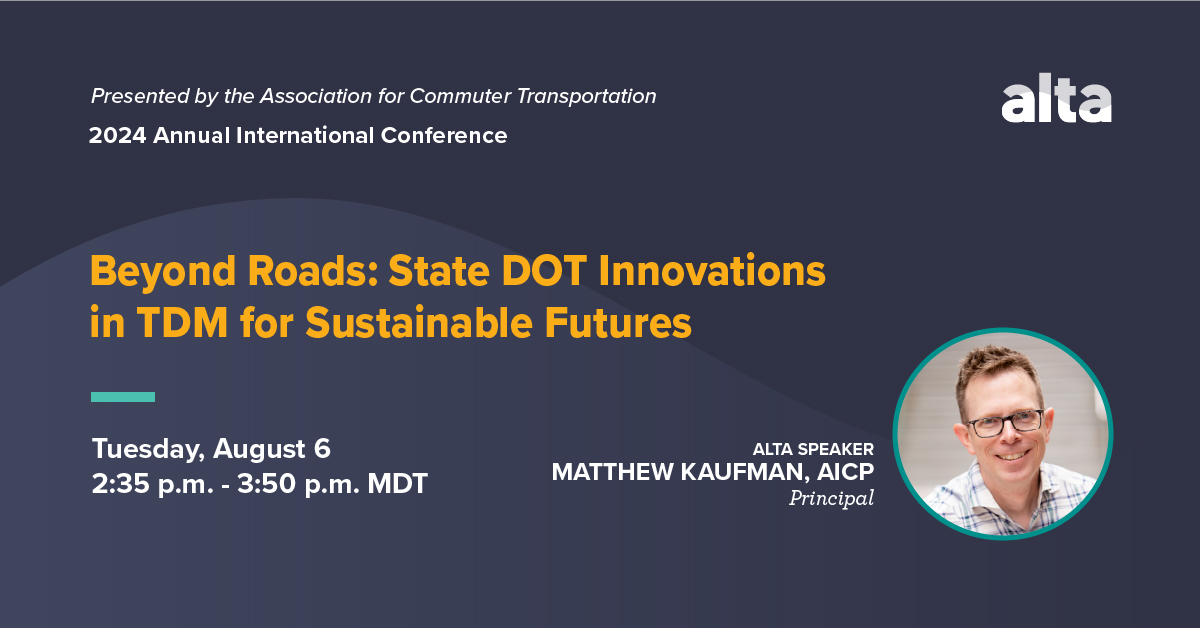
Beyond Roads: State DOT Innovations in TDM for Sustainable Futures
Tuesday, August 6 | 2:35 p.m. – 3:50 p.m. MDT
TDM has changed significantly, from shifts in travel behavior to emerging mobility solutions. Discover how state DOTs are adapting to these changes with three leaders from Oregon, Colorado, and Tennessee. The panelists will delve into new funding opportunities, intensified efforts on equity and safety, navigating innovative partnerships, and progressive TDM-forward policies impacting roadway construction projects. Join us for an insightful session featuring real-world insights from recent research efforts, impacts from statewide TDM policies, and results from efforts implemented in underserved communities.
Alta Speaker: Matthew Kaufman
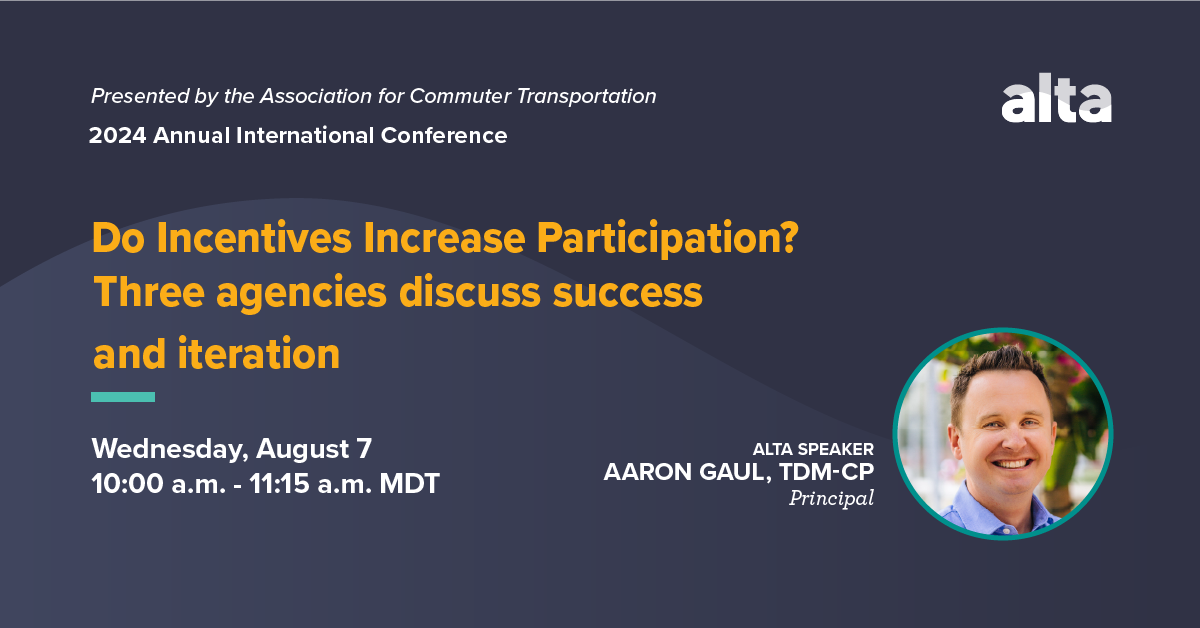
Do Incentives Increase Participation? Three agencies discuss success and iteration
Wednesday, August 7 | 10:00 a.m. – 11:15 a.m.
Experts from three regional agencies in California, Georgia, and Ohio will share how they design and use incentive programs to promote shared and active transportation. Learn how MORPC, Commute.org, and ARC are designing, funding, and iterating on programs that include meaningful incentives to increase participation and adoption of shared and active transportation. Attendees will learn how agencies measure success with incentives, and how they use results to improve future programming. The session will include succinct and informative individual presentations followed by a lively discussion and question period, involving the audience, moderated by Aaron Gaul, TDM-CP.
Alta Speaker: Aaron Gaul

